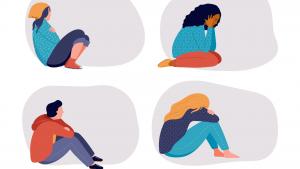At the heart of all my work as Children’s Commissioner are the voices of children. Every day my team and I hear directly from children about their experiences of home life, school, their friendships, as well as the challenges they face. I regularly visit children and young people in schools, colleges, Young Offenders Institutions, care homes and many other settings.
The importance of good mental health and wellbeing comes up on every single visit.
It’s also clear from the responses I have had to my Big Ask and Big Ambition surveys how important good mental health is to England’s children and young people.
I have been really concerned that latest NHS data shows that one in five children has a probable mental health disorder.
As one 18-year-old girl said in response to the Big Ambition Survey: “Invest in mental health services for 16-25, there is a gap and its awful, something needs to change.”
Children often tell me that issues with their mental health and wellbeing are significant barriers to their overall success. They also tell me that want our help and support so they can achieve the ambitions they have.
Over the last few months, I have asked children and young people in the Big Ambition what they think would make their lives and the lives of other children better. I have asked them what they want decision makers to do ahead of the next general election.
The Big Ambition will be published soon and will draw directly on children’s responses to find practical policy solutions that will have a tangible impact on children’s lives.
As Children’s Commissioner, the theme of this year’s Children’s Mental Health week ‘My Voice Matters’ could not be more pertinent or important. Children and young people don’t feel their voices are heard and taken into account and we must change that especially when it comes to mental health and well-being.
My last annual report into children’s mental health found a surging demand for help. Unfortunately, the welcome progress that has been made in recent years on improving children’s access to the right support is struggling to keep up with this demand – with waiting times increasing for the first time in years.
Later this year my office will publish the next children’s mental health services report for 2022-2023 and I will also be exploring how long children are waiting for neurodevelopmental services.
Children’s mental health services are stretched like never before. This affects children at all levels of need, but perhaps most troublingly those children living in mental health inpatient settings who say time and again that if only the right help had been there earlier on, they wouldn’t have ended up in hospital.
Getting mental health support earlier with professionals who really understand what’s happening for young people is vital.
I am also really concerned about the mental health of children who are living in institutions. I don’t want to see any child living in an institution. All children should be able to live in a caring familial environment even if they can’t live within their own families. Children who are living in institutions often tell me that they feel like their voices too often go unheard by those making decisions about them.
My recent report on children’s access to advocacy found that there was limited information available about children in inpatient settings access, although they have a right to such provision.
We need to make sure that all children’s views are heard and that there is a relentless focus on getting children out of inappropriate institutions and back home wherever possible. This is why I have repeatedly called for a reformed Mental Health Act to help deliver on this.
I think Children’s Mental Health week is so incredibly important to raise awareness and ensure we focus on this issue. We must listen to children and really hear what they are telling us.
As one 13-year-old said in response to the Big Ambition. “Mental health care could also improve like more easy access to the help we need.”
Access is vital as is getting help as early as possible. I want to see every child getting the right support in their community as soon as they need it. Our children want it, and they deserve it so they can live their lives and thrive.






